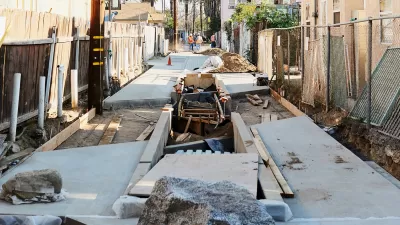The state of California, along with county and city officials, have taken several steps forward on plans and projects that could help Los Angeles wean itself from imported water.
Monte Morin reported in mid-June that the California State Water Resources Control Board adopted new rules "aimed at capturing and reusing huge amounts of stormwater that have until now flowed down sewers and concrete rivers into the sea." The rules apply to Los Angeles County, but they're being pitched as "a model for other parts of water-starved California."
In effect, the rule change allows "a controversial set of revisions to Los Angeles County's stormwater discharge permit."
"Among other things, the revisions provide a framework for cities to plan and build aquifer recharge systems and other forms of "green infrastructure," according to Morin.
Later in the month, the Los Angeles Department of Water and Power (LADWP), a city agency, announced its Stormwater Capture Master Plan—"an initiative that officials say will reduce the city's future reliance on imported water and perhaps address a predicted trend toward heavier, more intense rainfall."
Morin summarizes more of the LADWP master plan:
"The plan includes three large-scale projects in the San Fernando Valley that would collect rainfall in basins or washes and then slowly feed it into the city's primary underground water source — a process known as aquifer recharge.
The proposal also lists a variety of smaller features that would be located on public, private and commercial properties throughout the city: Water-permeable surfaces that would help recharge the San Fernando Valley groundwater basin, as well as redesigned 'green streets' and pocket parks."
FULL STORY: L.A. County's plan to capture stormwater could be state model

Planetizen Federal Action Tracker
A weekly monitor of how Trump’s orders and actions are impacting planners and planning in America.

Restaurant Patios Were a Pandemic Win — Why Were They so Hard to Keep?
Social distancing requirements and changes in travel patterns prompted cities to pilot new uses for street and sidewalk space. Then it got complicated.

Map: Where Senate Republicans Want to Sell Your Public Lands
For public land advocates, the Senate Republicans’ proposal to sell millions of acres of public land in the West is “the biggest fight of their careers.”

Maui's Vacation Rental Debate Turns Ugly
Verbal attacks, misinformation campaigns and fistfights plague a high-stakes debate to convert thousands of vacation rentals into long-term housing.

San Francisco Suspends Traffic Calming Amidst Record Deaths
Citing “a challenging fiscal landscape,” the city will cease the program on the heels of 42 traffic deaths, including 24 pedestrians.

California Homeless Arrests, Citations Spike After Ruling
An investigation reveals that anti-homeless actions increased up to 500% after Grants Pass v. Johnson — even in cities claiming no policy change.
Urban Design for Planners 1: Software Tools
This six-course series explores essential urban design concepts using open source software and equips planners with the tools they need to participate fully in the urban design process.
Planning for Universal Design
Learn the tools for implementing Universal Design in planning regulations.
Heyer Gruel & Associates PA
JM Goldson LLC
Custer County Colorado
City of Camden Redevelopment Agency
City of Astoria
Transportation Research & Education Center (TREC) at Portland State University
Camden Redevelopment Agency
City of Claremont
Municipality of Princeton (NJ)




























